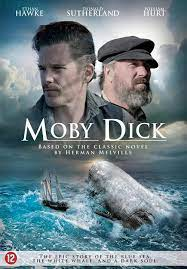Who is Herman Melville:-

Introduction of the Novel:-

"Moby-Dick" is a novel by American author Herman Melville, first published in 1851. It is a classic of American literature and is widely regarded as one of the greatest works of Western literature. The novel tells the story of Ishmael, a sailor who joins a dangerous whaling voyage as a means of escape from the land and its problems. He becomes obsessed with hunting the white whale Moby-Dick, who he sees as a symbol of evil. Along the way, he encounters a diverse cast of characters, including the mad captain Ahab, who is also obsessed with killing the whale.
The novel explores a number of themes, including the nature of evil, obsession, revenge, and the existential struggle of man against nature. It also contains elements of adventure, romance, and philosophy, making it a rich and multi-layered work. "Moby-Dick" is widely recognized as a masterpiece of American literature and continues to be widely read and studied today.
The novel is a complex allegory that explores themes of obsession, revenge, the nature of evil, and the relationship between humans and the natural world. Throughout the novel, the characters struggle with their own individual demons, including Ahab's intense hatred for Moby-Dick, which becomes all-consuming and leads him to madness. The crew of the Pequod is made up of diverse individuals from different backgrounds and cultures, and their interactions and experiences on the ship serve to illustrate the complex and often contradictory nature of humanity.
The novel is renowned for its rich, imaginative language and its exploration of universal themes that are still relevant today. It is considered one of the greatest works of American literature and has had a profound impact on the world of literature and popular culture.
THEMES IN THE NOVEL:-
The Limits of Knowledge
As Ishmael tries, in the opening pages of Moby-Dick, to offer a simple collection of literary excerpts mentioning whales, he discovers that, throughout history, the whale has taken on an incredible multiplicity of meanings. Over the course of the novel, he makes use of nearly every discipline known to man in his attempts to understand the essential nature of the whale. Each of these systems of knowledge, however, including art, taxonomy, and phrenology, fails to give an adequate account. The multiplicity of approaches that Ishmael takes, coupled with his compulsive need to assert his authority as a narrator and the frequent references to the limits of observation (men cannot see the depths of the ocean, for example), suggest that human knowledge is always limited and insufficient. When it comes to Moby Dick himself, this limitation takes on allegorical significance. The ways of Moby Dick, like those of the Christian God, are unknowable to man, and thus trying to interpret them, as Ahab does, is inevitably futile and often fatal.
The Deceptiveness of Fate
In addition to highlighting many portentous or foreshadowing events, Ishmael’s narrative contains many references to fate, creating the impression that the Pequod’s doom is inevitable. Many of the sailors believe in prophecies, and some even claim the ability to foretell the future. A number of things suggest, however, that characters are actually deluding themselves when they think that they see the work of fate and that fate either doesn’t exist or is one of the many forces about which human beings can have no distinct knowledge. Ahab, for example, clearly exploits the sailors’ belief in fate to manipulate them into thinking that the quest for Moby Dick is their common destiny. Moreover, the prophesies of Fedallah and others seem to be undercut in Chapter 99, when various individuals interpret the doubloon in different ways, demonstrating that humans project what they want to see when they try to interpret signs and portents.
The Exploitative Nature of Whaling
At first glance, the Pequod seems like an island of equality and fellowship in the midst of a racist, hierarchically structured world. The ship’s crew includes men from all corners of the globe and all races who seem to get along harmoniously. Ishmael is initially uneasy upon meeting Queequeg, but he quickly realizes that it is better to have a “sober cannibal than a drunken Christian” for a shipmate. Additionally, the conditions of work aboard the Pequod promote a certain kind of egalitarianism, since men are promoted and paid according to their skill. However, the work of whaling parallels the other exploitative activities—buffalo hunting, gold mining, unfair trade with indigenous peoples—that characterize American and European territorial expansion. Each of the Pequod’s mates, who are white, is entirely dependent on a nonwhite harpooner, and nonwhites perform most of the dirty or dangerous jobs aboard the ship. Flask actually stands on Daggoo, his African harpooner, in order to beat the other mates to a prize whale. Ahab is depicted as walking over the black youth Pip, who listens to Ahab’s pacing from below deck, and is thus reminded that his value as a slave is less than the value of a whale.

No comments:
Post a Comment